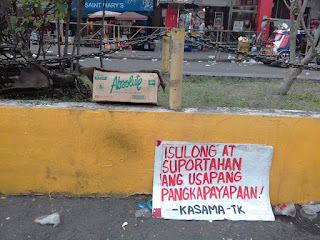"30 years yet still desiring for land and justice"
Notes on the 30th anniversary of Mendiola Massacre
And the Filipino peasant's strong desire for land and justice
Like any other decades-old issue in which a third world country continues to linger, the peasant question in the Philippines remains questionable in spite of the government's efforts to resolve that matter.
And in relation to that, it's been thirty years as peasant folks as well as the Filipino people remembers a tragic incident that swung a supposed revolutionary government into a reactionary one. As thirteen farmers end killed and thirty nine wounded, all yearning for land and justice in Mendiola.
And today, decades after the bloody massacre, the families of the victims and the survivors are still waiting for justice to be served.
 |
| Photo by Luis Liwanag |
With that incident, peasants continue to live under feudal bondage to the land; facing hardship or even threat as one after another yearn for social justice. Various laws concerning the agrarian question did little to resolve if not instead consolidate the rule of the few with its interest seeking venture undermining the interests of many.
And with such failures showed how the landless and impoverished peasants been subjected to horrendous state neglect as well as violent suppression by the military forces guided by US-inspired counter-insurgency programs. Peasant related incidents like the Hacienda Luisita Massacre of 2004 and the Kidapawan Massacre, both happened under BS Aquino administration, and the recent shooting of 13 farmers of Lapanday Foods Corporation (LFC) at Mindanao attest to the continuing brutal suppression and attempts to silence peasantfolks and its desire for land and justice.
And amidst state-sponsored "reforms" and "actions", the century-old enslavement of Filipino farmers still continues to this present day, especially under the escalating assault of neoliberal globalization on the national economy that perpetuates the monopolization of enormous tracts of lands by the big landlords, emboldens the compradore bourgeoisie and bureaucrat capitalists to squeeze profits from the debt-ridden farmers, fast-tracks the conversion of agricultural lands to commercial centers with alibis such as "national development" and "foreign investments", tolerates usurious lending institutions that prey on the blood and sweat of peasantfolks, and exacerbates the massive exodus of landless farmers from rural areas to urban centers all in search of work.
Such truths are supported by multinational moneylenders whose perception of "development" has nothing to do with emancipation especially those of the peasantfolks in the Philippines, while reforms brought upon by a semifeudal-semicolonial order did little or nothing as scraps of paper as peasant, worker, all impoverished alike still desiring for a real profound sense of social justice as shown by recent mass actions.
Incidents like the Mendiola Massacre and the persistent oppression of Filipino farmers have led to the mass recruitment of these poor peasantfolks to the revolutionary movement that seeks to overthrow the yoke of feudalism, bureaucrat capitalism, as well as imperialist stranglehold on the land, as well as agricultural workers and fisherfolks. In this protracted people’s war, the revolutionary forces in its liberated zones have been successful in implementing agrarian revolution, organizing the farmers, especially women and their families as social units of production, and the free distribution of lands.
And in response to these victorious actions and awakenings, the ruling class unveiled its fascistic moves, as it unleashed the most brutal and dirtiest wars of suppression all by occupying communities into hamlets and garrisons, ransacking peasant-established schools, harassing peasant leaders and supporters, abducting and killing peasant organizers, and branding legitimate peasant organizations as subversive, and even terrorist-supporting groups.
In this vein, the resumption of peace-talks under the present Duterte Administration is a welcome development for advancing the peasant’s struggle as part of national emancipation. The coming third round of negotiations between the Government of the Republic of the Philippines and the National Democratic Front of the Philippines in Rome, Italy will focus on much needed social and economic reforms that will also address the persistent impoverishment of our landless peasants, agricultural workers, as well as their communities.
Also in this resumption of peace talks the release of political detainees, some of who are peasant leaders and supporters, will also be discussed.
Such realities has made the Filipino people to assert even further the desire for both national and social justice. With the ever prevailing crisis and repressions especially those against peasantfolks, lies a call to put an end to feudal bondage not just a serious and trustworthy implementation of agrarian reform.
And in relation to the present status of negitiations between GRP and the NDF, lies the demand to release political detainees, especially those whose basis is their struggle for both land and justice as peasant organisers, leaders, as well as sympathisers whose charges been trumped up by the authorities; as well as an agreement on both sides involving a serious, trustworthy, and pro-people kind of socio-economic reforms; creating a way that is, towards a just and lasting peace.
All for the victims and martyrs of this decades old feudo-colonial injustice.
Such realities has made the Filipino people to assert even further the desire for both national and social justice. With the ever prevailing crisis and repressions especially those against peasantfolks, lies a call to put an end to feudal bondage not just a serious and trustworthy implementation of agrarian reform.
And in relation to the present status of negitiations between GRP and the NDF, lies the demand to release political detainees, especially those whose basis is their struggle for both land and justice as peasant organisers, leaders, as well as sympathisers whose charges been trumped up by the authorities; as well as an agreement on both sides involving a serious, trustworthy, and pro-people kind of socio-economic reforms; creating a way that is, towards a just and lasting peace.
All for the victims and martyrs of this decades old feudo-colonial injustice.



